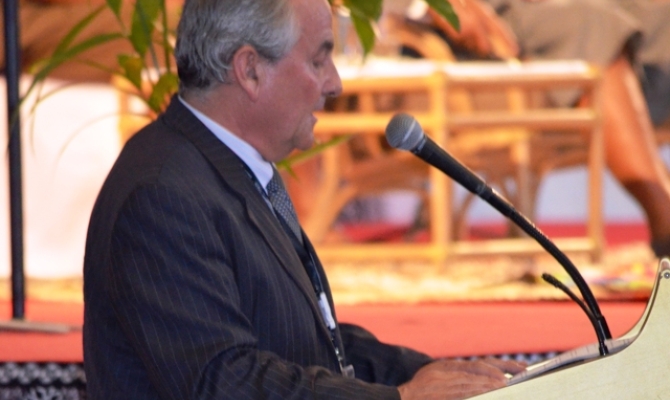
Island and Ocean Ecosystems

By Carolyn Kitione, a journalism student of the University of the South Pacific
2 December 2013, Suva Fiji - Delegates to the 9th Pacific Islands Conference on Nature Conservation and Protected Areas have been urged to get involved in the Action Strategy for Nature Conservation that will endorse practical actions and priorities for the next five years.
In his opening remarks, SPREP's Director General David Sheppard said the conference should be seen as a stepping stone toward more effective biodiversity conservation in the Pacific.
"Our conference this week is a landmark opportunity to protect and better manage our precious Pacific biodiversity," he said.
He said the Pacific's biodiversity was at high risk as the extinction rates in the region were among the highest in the world.
"In the Pacific region our biodiveristy is of global significance with high endemism and biodiversity," he said.
"For example, 7 per cent of the planet's biodiversity is located within Papua New Guinea, even though it represents 0.6 per cent of the global land area."
Mr Sheppard also focused on the linkages between biodiversity and other key issues in the region, specifically with regards to climate change, quoting the Kiribati President, "climate change is a matter of national security".
He said at the recent Climate Change Convention, COP19, in Warsaw, Poland, there was little mention of biodiversity and ecosystem management.
"Climate change has been articulated by Pacific leaders as the major challenge in the region," he said.''
"I heard very little in Warsaw about biodiversity and ecosystem management. However, we know from our region that there is a clear and important link."
He offered examples from several Pacific Island nations as cases for cost-effective ways to positively address climate change in the region.
"The partnership project in Choiseul Province in the Solomon Islands, involving SPREP, SPC, all levels of Solomon Islands Government and many NGO and other partners, is showing that ecosystem-based adaptation can and should be a key frontline response to a changing climate in our region."
Carolyn Kitione is a member of the Media Team providing coverage of the 9th Pacific Islands Conference on Nature Conservation and Protected Areas from 2 to 6 December in Suva, Fiji. This is a partnership between the Fiji National University (FNU), University of the South Pacific (USP), SPREP and Pacific Islands News Association (PINA) whereby a team of 10 journalism students are mentored by senior reporters as they cover the conference. This activity is funded by the Pacific Assistance Media Scheme.